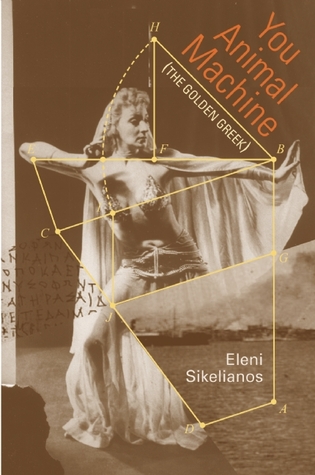In the Mojave Desert, poet Eleni Sikelianos writes in her slippery, edges-all-over essay-memoir You Animal Machine, you can never see anything straight on. Sights are caught in the corner of the eye: a potent detail, a skittering movement, a mirage. So it is with the story of Sikelianos’s grandmother Melena—exotic dancer, rock-hound, survivor of five husbands—as Sikelianos tells it: her story is particulate, dispersing into details that fly apart and randomly collide again, allowing coherence to be glimpsed only sidelong. “Shake it up at the corners as you would a blanket,” Sikelianos says of the Mojave, where Melena ended her days: “that’s the story: the dust like agitated electrons up to no good… If you look closely you’ll see that everything’s on the verge of impact.”
Through artifacts—lists of songs, newspaper clippings, photographs, film posters, staged interviews, poems—the poet Sikelianos assembles a textual chimera that keeps sliding through her fingers. “I can’t seem to keep her in reality,” she writes of Melena, known as the Leopard Girl. “She keeps slipping out into the desert… She keeps slipping back into cat.” Even text, it seems, can’t hold her still: Melena’s very name shifts and changes, its “letters feral and bouncing like blobs of dark light jostling for places.” Born Helene Pappamarkou, she is variously known as Elaine, Elayne, Eleni, the Golden Greek, Marco the Cat Girl, and Melaine Marko. Melaina means “black” in Greek, and Sikelianos also associates Melena with Demeter Melaine, Greek goddess of fertility and agrarian mysteries, who allows things (plants, the dead) to rise up from the earth—and whose daughter, Persephone, was raped and abducted by Hades. Fertility has a dangerous edge here, its mysteries tended by goddesses and temple dancers, Melena’s precursors in the burlesque. Like them, “she is swallowed deep underground but… pops back up with the crocuses at the end of the dance.”
The story begins, psycho-genealogically speaking, with the author’s great-grandfather, a Greek immigrant and musician known as John Diamond or Diamond John, who “locked his daughter in the closet with a loaf of bread and a jug of water” and left her there for days. The rest of his children were dropped off at an orphanage and never picked up. Melena finds one brother forty years later; the fates of the rest, even their names, are unknown. But it’s the locked closet that serves as Melena’s (and her daughter’s, and her daughter’s daughter’s) primal scene: it...
You have reached your article limit
Sign up for a digital subscription and continue reading all new issues, plus our entire archives, for just $1.50/month.
Already a subscriber? Sign in





